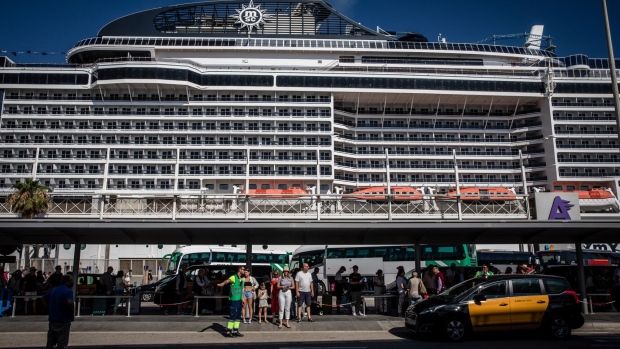Mar 19, 2024
Europe Cruise Industry Eyes Green Investment With Emissions Plan
, Bloomberg News

(Bloomberg) -- Europe’s cruise lines are arguing that some of the cash from emissions reduction programs should be plowed back into infrastructure investments, as the industry prepares to electrify ports and ships.
With cruise operators set to start contributing to the European Union’s emissions trading program, the global Cruise Lines International Association, or CLIA, wants “countries to be able to reinvest all, or at least some, of this extra revenue into infrastructure,” Europe Director General Marie-Caroline Laurent said in an interview.
The sums are not inconsiderable. Europe’s cruise sector is slated to contribute more than €600 million ($655 million) to the emissions program, known as ETS, starting in 2026, Laurent said.
But at least part of that total would be better used if it were redeployed toward clean infrastructure for the industry — in areas from reduced emissions at berth and at sea, to programs for sustainable facilities at destination ports, Laurent said.
Infrastructure is a “key concern,” Laurent said, as electrification of ports and refueling facilities will be essential for the industry’s future.
Few industries have faced a tougher post-pandemic challenge than cruise lines. Even after a sharp rally last year, shares have yet to snap back to pre-pandemic highs. Non-fuel costs — fleet maintenance, food and onboard services — are also expected to rise in coming quarters.
Currently about half of the industry’s vessels are set up for next-generation shore-side electricity, Laurent said. That puts the onus on ports to update facilities.
“We obviously need the ports to be equipped with the newest outlets and to have electrification capability,” she said.
For a possible model, Laurent pointed to the aviation sector, where sustainable SAF fuel is rated zero-emission and doesn’t count toward emissions calculations.
Read More: White House Is Seen Missing Deadline Tied to Jet Fuel Tax Credit
For cruise operators, “this kind of mechanism would be a good way to accelerate the deployment of alternative fuels,” Laurent said.
©2024 Bloomberg L.P.


